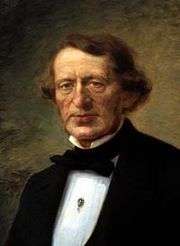Lars Johan Hierta
Lars Johan Hierta (Swedish: [lɑːʂˈjûːan ˈjæ̂ʈːa]; 22 January 1801 – 20 November 1872) was a Swedish newspaper publisher, social critic, businessman and politician. He is best known as the founder of the newspaper Aftonbladet in 1830. Hierta was a leading agitator for political and social reform in Sweden during the 19th century. He is sometimes credited as the "father of the free press" in Sweden.

Biography
.png)
Hierta was born to a noble family in Uppsala, Sweden, as the son of Carl Didrik Hierta and Hedvig Johanna Schméer. He received his primary education at a private school and began his studies at Uppsala University in 1814, where he earned a Doctor of Philosophy and a Candidate of Law in 1821. In the same year he was employed as an unpaid trainee at the central government agency Bergskollegium, where he was promoted as a law clerk in 1825.
In the mid-1820s, Hierta met Wilhelmina Fröding, his future wife. Although her family rejected his initial marriage proposal, they married in 1833 and together had five daughters.[1]
At the Riksdag of the Estates of 1823, Hierta served as a secretary at the Swedish House of Lords. At the following Estates Assembly, from 1828 to 1830, he was a representative of the nobility and also served as a law clerk. In the Riksdag, Hierta aligned himself with the liberal opposition critical of the conservative rule of King Charles XIV John.
Hierta started writing for Conservationsbladet in 1823. He also wrote for the papers Argus from 1824 to 1826 and, sporadically, Stockholmsposten from 1826 to 1828. He started writing as a humourist, later as a news writer and political editorialist.
In 1829, Hierta started the book publishing house Hiertas bokförlag ("Hierta's Publishing House").
In 1830, Hierta founded the Aftonbladet newspaper, where he advocated for a republic (though without using the word "republic"), which is sometimes seen as the start of the Swedish republican movement.
In 1839 Lars Johan Hierta founded a candle factory still active today by the name of Liljeholmens Stearinfabriks AB.
Soon after 1840, Aftonbladet hired Swedish writer and feminist Wendela Hebbe (1808–1899), who became the first permanently-employed woman journalist at a Swedish newspaper. Hierta and Hebbe later had a son together. Both Hierta and Hebbe were socially active for liberal causes.[2]
At the time of his death, Hierta was one of the wealthiest persons in Sweden.[3] After his death, his widow Wilhelmina Fröding Hierta donated 100,000 SEK to Stockholm University for the establishment of a professorship in economics, and later 400,000 SEK to the foundation Lars Hiertas minne ("Lars Hierta's Memory") whose mission was to "work freely and independently for human progress" (fritt och oberoende verka för det mänskliga framåtskridandet).[4]
Further reading
- Wieselgren, Harald (1880). Lars Johan Hierta : biografisk studie (in Swedish). Stockholm: Linnström.
- Hierta, Lars Johan (1901). Sjelf-biografiska anteckningar (in Swedish). Stockholm: Harald Wieselgren.
- Kihlberg, Leif (1968). Lars Hierta i helfigur (in Swedish). Stockholm: Bonnier.
- Lönnroth, Ami; Mattsson, Per Eric (1996). Tidningskungen : Lars Johan Hierta : den förste moderne svensken (in Swedish). Stockholm: Wahlström & Widstrand. ISBN 91-46-16938-5.
References
- Parner, Mats (December 16, 2018). "En ljusgestalt med ett varmt klappande hierta". Lindelof.nu. Retrieved June 1, 2019.
Frieriet avslogs emellertid – inte av fröken Mina själv men väl av hennes bror och förmyndare som, ironiskt nog, ifrågasatte den välbeställde giljarens ekonomiska status. Först i december 1833 ägde bröllopet rum. (However, the proposal was rejected - not by Miss Mina herself, but by her brother and guardian who, ironically, questioned the well-ordered gill's economic status. Only in December 1833 did the wedding take place)
- Teiffel, Yvonne (20 September 2017). "Wendela var den första kvinnliga journalisten (Wendela was the first woman journalist)". Jönköpings-Posten. Retrieved 26 July 2019.
I samband med 200-årsminnet av Wendela Hebbe 2008 instiftade Wendelas Vänner ett årligt pris på 50 000 kronor. Det delas på söndag ut i Wendela Hebbes hus i Södertälje, det som hon en gång fick av Lars Johan Hierta. (In connection with the 200-year memory of Wendela Hebbe 2008, Wendelas Friends established an annual prize of SEK 50,000. It is shared on Sunday in Wendela Hebbe's house in Södertälje, which she once received from Lars Johan Hierta.)
- Wirén, Karl-Hugo. "Hierta, Lars Johan". Nationalencyklopedin. Höganäs: Bra Böcker.
- Wichman, Knut (December 7, 2018). "Lars Johan Hierta". Svenskt biografiskt lexikon. Retrieved May 30, 2019.
H:s änka donerade 100 000 kr till en professur i nationalekonomi under hans namn vid Sthlms högskola o 400 000 kr till en fond med namnet L H:s minne, avsedd att "fritt och oberoende verka för det mänskliga framåtskridandet". (En. H's widow donated SEK 100,000 to a professorship in economics under his name at Sthlm University and SEK 400,000 to a fund named LH's memory, intended to "work freely and independently for human progress")
External links
| Wikimedia Commons has media related to Lars Johan Hierta. |
- Aftonbladet under 170 år (in Swedish)